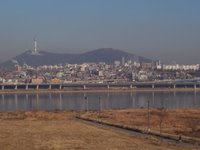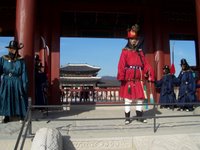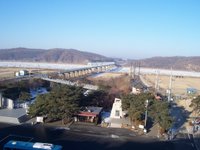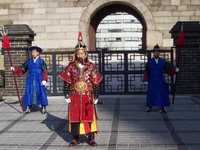 I’ve been thinking all week about the hysterical sobbing in those images of North Koreans mourning Kim Jong-il. Was it pretend-crying just to avoid looking different to everyone else? Was it just group hysteria? Was it stage managed by the government and then exaggerated out of all proportion? Was it genuine grief for a leader that was a daily presence to them? Was it grief for their own loved one who have died in famines and their miserable fortune to live in such an accursed place? Was it fear that things could get worse under Kim Jong-un? Was it simply just a great chance to cry uncontrollably and not look out of place?
I’ve been thinking all week about the hysterical sobbing in those images of North Koreans mourning Kim Jong-il. Was it pretend-crying just to avoid looking different to everyone else? Was it just group hysteria? Was it stage managed by the government and then exaggerated out of all proportion? Was it genuine grief for a leader that was a daily presence to them? Was it grief for their own loved one who have died in famines and their miserable fortune to live in such an accursed place? Was it fear that things could get worse under Kim Jong-un? Was it simply just a great chance to cry uncontrollably and not look out of place?The ambiguities hidden in the tears define North Korea as it has done since the end of World War II. When the Democratic People's Republic of Korea set up shop in the northern part of the peninsula in 1946 they were faced with two big problems. The North had always been more remote and less developed and now 2 million more fled south to avoid the Communist DPRK. The three-war that followed left the new country in tatters.
North Korea converted to a centrally planned economy which strangled small business. Dissent was not tolerated and all good was embodied in leader Kim Il-sung. In turn Il-Sung promoted “Juche” as a concept of self-reliance which would have to make do in difficult times. Il-Sung said juche meant man was the master of everything and decided everything. That man was him and he mobilised the entire workforce to industrialise North Korea rapidly after the civil war.
But always suspicious of the South, they built up their military might to deter invasion. They ran up massive debts mainly to the USSR, China and Japan. By 1980 they defaulted on all their loans and the economy has been contracting ever since. The collapse of Soviet Communism in 1989 left Russia unimpressed with their poverty-stricken debtor. That meant an increasing reliance on China with which DPRK shared philosophies and its only open border. Il-sung refused to consider Gorbachev’s perestroika because he knew it led to glasnost. He died in 1994 and first son and heir apparent Kim Jong-il took over.
Born in 1942 Jong-il spent his first years in Siberia with his parents. His father commanded the 1st battalion of the 88th Brigade, a Red Army unit made up of Chinese and Korean exiles. Jong-il was born in Vyatskoye, a fishing village near Khabarovsk where the railway turns south to Vladivostok. As a schoolboy, Jong-il was interested in politics and Marxist literature. He learned English in Malta and as early as 1980, was effective head of the politburo with only his father to look up to. He inherited his father’s personality cult and was named head of the armed forces in 1991.
With Jong-il making all the decisions since they defaulted on their debts, North Korea’s economy collapsed. When Il-Sung finally collapsed in 1994, aged 82, Jong-il was undisputed leader. The US were worried by his nuclear ambitions and threats to leave the Nuclear Non Proliferation Treaty. The countries signed an Agreed Framework as one of Jong-il’s first achievements in office. It allowed the DPRK to continue developing nuclear technology at foreign expense but with light water reactors rather than the nuclear proliferating graphite reactors they already had.
The US overplayed its hand. President Clinton rashly assumed North Korea was on the verge of collapse and DPRK officials knew his assumption. Congress would not pass a bill to end the trade embargo in place since the end of the Korean War and the US dragged its feet in calling for tenders to build the new reactors. By October 2002, the US believed North Korea had an enrichment program and confronted them with their evidence. Three months later North Korea left the NNPT. The Framework was no longer Agreed and the subsequent Six Party talks were almost completely fruitless. North Korea had gone rogue.
While nuclear testing proceeded with Iranian and Pakistani know-how, the fate of the people of North Korea worsened. Jong-il oversaw a collapse in industry and technology and floods and storms in 1995 wrecked existing electricity and health infrastructure and destroyed harvests. Hungry peasants ate what survived before it was fully developed and the country could no longer feed itself. Women and children bore the brunt of the death toll of a million or more in the three years that followed.
Food from China, South Korea and the US eased the situation until Jong-il refused all overseas aid in 2002. Inclusion in Bush’s 2002 State of the Union “Axis of Evil” heightened the sense of North Korea’s isolation. Famine conditions worsened again. Recent escapees told the BBC hunger and starvation were common with homeless people dying in the railway station, and others too weak to beg. Complaining about this inside the country would lead to instant imprisonment.
 It’s not difficult to imagine the logical leaps of doublethink North Koreans must take in order to make sense of their world. Death is all around them but so is a regime that demands obedience and Juche. Even when people were confronted on the street by evidence of the failure of the regime, their total reliance state media meant foreign powers and the evil South could always be conjured up as scapegoats.
It’s not difficult to imagine the logical leaps of doublethink North Koreans must take in order to make sense of their world. Death is all around them but so is a regime that demands obedience and Juche. Even when people were confronted on the street by evidence of the failure of the regime, their total reliance state media meant foreign powers and the evil South could always be conjured up as scapegoats. The extraordinary scenes in Pyongyang after Jong-il’s death are not without precedence. This week’s public lamentation eerily resembles the carefully choreographed mourning after Kim Il-sung died. Life seemed almost too unbearable to go on without Dear Leader. But just as in 1994, the State machinery will be whipped into shape after a decent interval and the leadership cult will swing to Kim Jong-un. The world should learn from Clinton’s mistake. North Korea can survive dysfunction. Bellies may remain empty but the belicose dynasty of Dear Leader will continue. As the handpicked factory worker in the sobbing video said “I will change sorrow into strength and remain faithful to Comrade Kim Jong-un.” It’s best the North Koreans cry now because it will not be tolerated in six months time.








